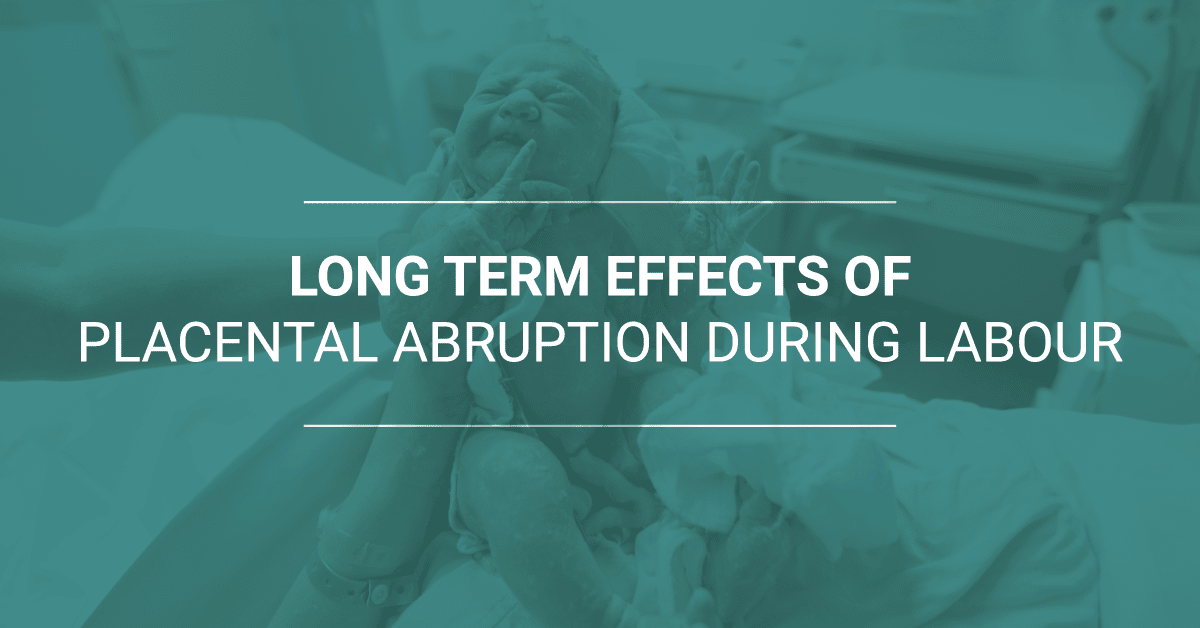
When a person is pregnant, a placenta develops in the uterus. The placenta provides oxygen and nutrients to the baby as it grows and removes waste products from the baby’s blood. If a problem develops with the placenta, it can affect the baby and mother’s health.
For example, if the placenta separates from the inner wall of the uterus, it causes a condition known as placental abruption. Because the placenta provides necessary oxygen and nutrients to the baby, placental abruption during labour can lead to complications such as asphyxia, hypoxic-ischemic encephalopathy (HIE), and/or cerebral palsy (CP). For mothers, placental abruption carries a risk of heavy bleeding and the need for an emergency caesarean section (c-section).
When a baby does not get enough oxygen during labour and delivery, it can cause a number of long-term effects. These complications cause permanent disabilities. Proper monitoring and early intervention to deliver a baby quickly can reduce the risk of brain damage from placental abruption during labour.
Long-Term Effects of Placental Abruption During Labour
Placental abruption during labour can be dangerous for both the mother and baby. Complications of placental abruption may include:
- Premature birth
- Fetal growth restriction
- Low birth weight
- Maternal blood loss and/or need for blood transfusion
- Maternal haemorrhage
- Blood clotting issues
- Oxygen deprivation for the fetus
- Fetal death
A failure to intervene promptly and quickly deliver a baby after a placental abruption can cause an infant to suffer severe oxygen deprivation, or birth asphyxia. When an infant is deprived of oxygen during labour and delivery, it may cause brain damage. This can lead to a number of conditions, such as HIE, neonatal encephalopathy, seizure disorders, microcephaly, and/or CP.
A recent study found that placental abruption during labour was associated with increased rates of cerebral palsy and developmental disorders. A separate review found that placental abruption is linked to acidosis (increased acidity in the blood and tissues), encephalopathy, severe respiratory disorders, necrotizing enterocolitis (bacteria invade the walls of the intestines), acute kidney injury, a need for resuscitation, chronic lung disease, and seizures (epilepsy).
The long-term effects of placental abruption during labour vary based on the severity of the oxygen deprivation. Potential effects may include motor disorders, intellectual disabilities, learning disabilities, developmental delays, and behavioural difficulties. They will often not meet developmental milestones on time, such as talking, crawling, and walking.
Children who survive placental abruption during labour may need extensive physical, speech/language, and occupational therapy. They will typically need regular medical care from a team of specialists. In some cases, a child who suffers a birth injury linked to placental abruption may never be able to live independently and will require lifelong care.
These long-term effects can put a serious financial and emotional strain on parents and caregivers. If a child’s birth injuries were caused by medical negligence due to a failure to appropriately monitor, diagnose, and/or intervene, then parents may be able to seek compensation through a birth injury lawsuit. An experienced birth injury lawyer can help you determine if you have a potential claim and will work with you throughout the process.
Risk Factors and Signs of Placental Abruption During Labour
The placenta is an organ that develops during pregnancy. It attaches to the wall of the uterus, with the baby’s umbilical cord rising from it. Throughout pregnancy, the placenta performs the crucial role of providing oxygen and nutrients to the baby and removing waste from the baby.
Placental abruption occurs when the placenta separates from the lining of the uterus before the second stage of labour has been completed. Although it is relatively rare, placental abruption during labour puts the health of both the mother and baby in jeopardy.
There is not a known cause of placental abruption. However, there are certain risk factors that increase the likelihood of this condition. These factors include:
- Smoking
- Using cocaine during pregnancy
- Advanced maternal age (over 35)
- Hypertension or preeclampsia
- Placental abruption during a prior pregnancies
- Multiple pregnancies
- Trauma to the abdomen (such as in a fall)
- Polyhydramnios (excessive amniotic fluid)
- Sudden uterine decompression (premature rupture of the membranes)
- Short umbilical cord
- Intrauterine growth restriction (IUGR)
- Induction of labour
There are certain signs of early placental abruption, such as vaginal bleeding, uterine pain or tenderness, abdominal pain, rapid contractions, fetal heart rate abnormalities, and back pain. If a pregnant person experiences any of these symptoms or has any risk factors for placental abruption during labour, a medical professional should carefully monitor the pregnancy and intervene as necessary.
There are three grades of placental abruption:
- Grade 1: small amount of vaginal bleeding and uterine contractions, but no signs of fetal distress or low blood pressure in the mother.
- Grade 2: moderate amount of bleeding and uterine contractions, and the baby’s heart rate may show signs of distress.
- Grade 3: medium to severe bleeding, contractions that do not relax, belly pain, and low blood pressure. Grade 3 abruptions often lead to the death of the baby.
There is no treatment available to stop placental abruption or reattach the placenta. Depending on how far along the pregnancy is and the severity of the abruption, it may be possible to have a vaginal delivery. Otherwise, an emergency c-section will be necessary to protect the health and well-being of both the mother and baby.
Placental Abruption Caused By Medical Negligence
In some cases, placental abruption occurs so early or is so severe that nothing can be done to save the life of the baby. But in other situations, closely monitoring a pregnancy and intervening quickly to deliver the infant can prevent birth injuries associated with placental abruption during labour. A failure to do so may be considered medical negligence.
If your baby suffered a birth injury due to a placental abruption during labour, then the case should be considered by a team of experienced birth injury lawyers. Contact BILA today at 1-800-300-BILA or via our online contact form for more information about a potential legal claim and to discuss your child’s birth injury case.
Related:
Effects of a Prolonged Labour on a Baby

John McKiggan, QC has represented clients in pediatric and adult injury claims that have resulted in multi-million dollar awards. In recognition of his accomplishments, John has been honoured by his peers, who elected him president of the Atlantic Provinces Trial Lawyers Association. He has also been named Queen’s Counsel, a designation recognizing exceptional professional merit. John has been selected for inclusion in the Best Lawyers in Canada in the field of personal injury law, he is listed in the Canadian Legal Lexpert Directory and has been named a local litigation star by Benchmark Litigation Canada.
